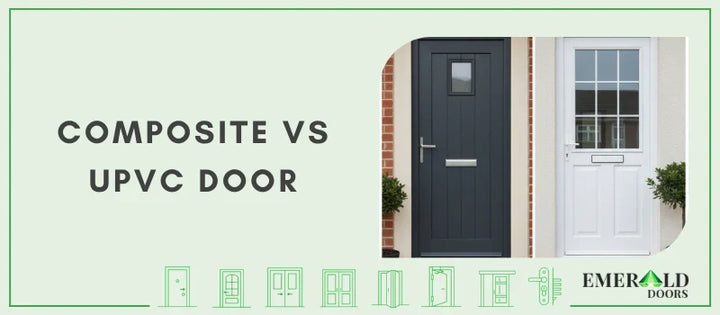
Composite vs UPVC Door: Which Is Best for Your Home?
Choosing a new front door for your house is a big decision, and many homeowners often struggle to pick between modern composite doors and classic uPVC doors. Both popular options offer great value, but they are built differently and offer unique benefits for your home. Understanding these differences helps you pick the right door for your home.
In this article, we will explain what composite doors and uPVC doors are. We will compare both in terms of durability, security features, energy efficiency, appearance, cost, and maintenance. By the end, you’ll be clearer about which door suits your home best.
What is a Composite Door?

A composite door is a modern front door made from different materials, including a timber core, foam, and a glass-reinforced plastic outer layer. These layers bond together under high pressure to create a thick layer, making it durable, secure, and weather-resistant. The outer layer often looks like real wood but needs far less maintenance and offers excellent insulation and long-lasting performance.
What is a uPVC Door?

A uPVC door uses unplasticised polyvinyl chloride, a strong type of plastic, for its frame and panels. The hollow chambers inside the frame trap air to keep your home warm and energy-efficient. These doors come in white, coloured, or woodgrain finishes to suit any home style. The plastic material resists rot, rust, and fading from sunlight. uPVC doors are lightweight, easy to maintain, and provide good insulation and security at an affordable price.
Differences Between Composite and uPVC and Doors
As both composite doors and uPVC doors are extremely popular in the UK, it can be hard to decide which one to select for your home. We have curated a list of differences between the two types of doors to make it easy for you to select your preferred door.
|
Feature |
Composite Door |
uPVC Door |
|
Material |
Made from timber, foam, and glass-reinforced plastic layers for strength and insulation. |
Made from strong plastic with hollow chambers; lightweight and moisture-resistant. |
|
Thickness |
The door is thicker and stronger, usually offering 44–48mm, giving a solid feel and better security. |
Thinner and lighter, usually around 28mm, making it less robust than composite. |
|
Security |
Superior security due to thick core and multi-point locking systems. |
Provides good security with reinforced panels and multi-point locks, but is less secure than composite. |
|
Thermal Efficiency |
Excellent insulation because of its solid timber or foam core, which keeps the home warmer and reduces energy bills. |
Provides good insulation due to air-filled hollow chambers, but slightly less energy efficient than composite doors. |
|
Look |
Composite door provides a premium, classic appearance that closely looks like real wood with realistic textures and finishes. |
Offers a clean and modern look, available in white, coloured, or woodgrain finishes, but is less natural-looking than composite. |
|
Durability |
Highly durable; resists warping, cracking, and weather changes. |
Durable under normal conditions, but may fade, warp, or crack over time with prolonged exposure to sunlight and weather. |
|
Maintenance |
Low maintenance, occasional cleaning is enough to keep it looking good. |
Very low maintenance, simply wipe with soap and water to keep it clean. |
|
Lifespan |
Can last 25–30 years or more and stay strong and good-looking with proper care. |
Usually lasts 15–20 years before it starts to show wear, depending on use and weather. |
|
Cost |
Has a higher upfront cost because of its strong materials and advanced manufacturing process. |
Cheaper compared to a composite door, making it a good budget-friendly option. |
|
Customization |
Offers higher customization options, such as colors, textures, and styles, to match any home. |
Offers fewer customizations with limited colour options and styles, so it is less flexible than composite doors. |
Conclusion
Both composite and UPVC doors are excellent choices for your home's entrance. Composite doors offer better strength, security, insulation, and a premium wood-like appearance, though they come at a higher cost. UPVC doors are lightweight, affordable, and require minimal maintenance, making them an ideal choice for homeowners seeking a modern and practical solution.
At Emerald Doors, we offer a wide range of high-quality composite doors, including both internal doors and external doors options, to suit every home and budget. Our experienced team guides you in selecting the perfect door that matches your style, requirements, and home design.
FAQs on the Difference Between UPVC and composite Doors
Here are answers to the most common questions homeowners ask when choosing between UPVC and composite doors for their home.
Are Composite Doors Better than UPVC Doors?
Yes, Composite doors offer better strength, security, and thermal efficiency than uPVC doors. They offer a premium, wood-like look and long-lasting performance, while uPVC doors are lighter, affordable, and low-maintenance. But the choice depends on your preferences and priorities.
What is the Price Difference Between UPVC and Composite Doors?
Composite doors are more expensive, costing around £800–£1,200, while uPVC doors range from £340–£499. This makes the difference roughly £600 or more. Composite doors are more expensive upfront due to durable materials and advanced construction, while uPVC doors are budget-friendly.
Is Composite Stronger than uPVC?
Yes, composite doors are stronger and thicker than uPVC doors. Their thick core and layered construction make them more durable, resistant to impact, warping, and forced entry, providing superior security and long-lasting performance.
Do Composite Doors Dade in Sunlight?
Composite doors do not fade over time, making them a stylish, durable, and worthwhile investment for your property. Your doors are required to make a great first impression of your home despite being exposed to rain, sunlight, pollution, and frequent use over time.